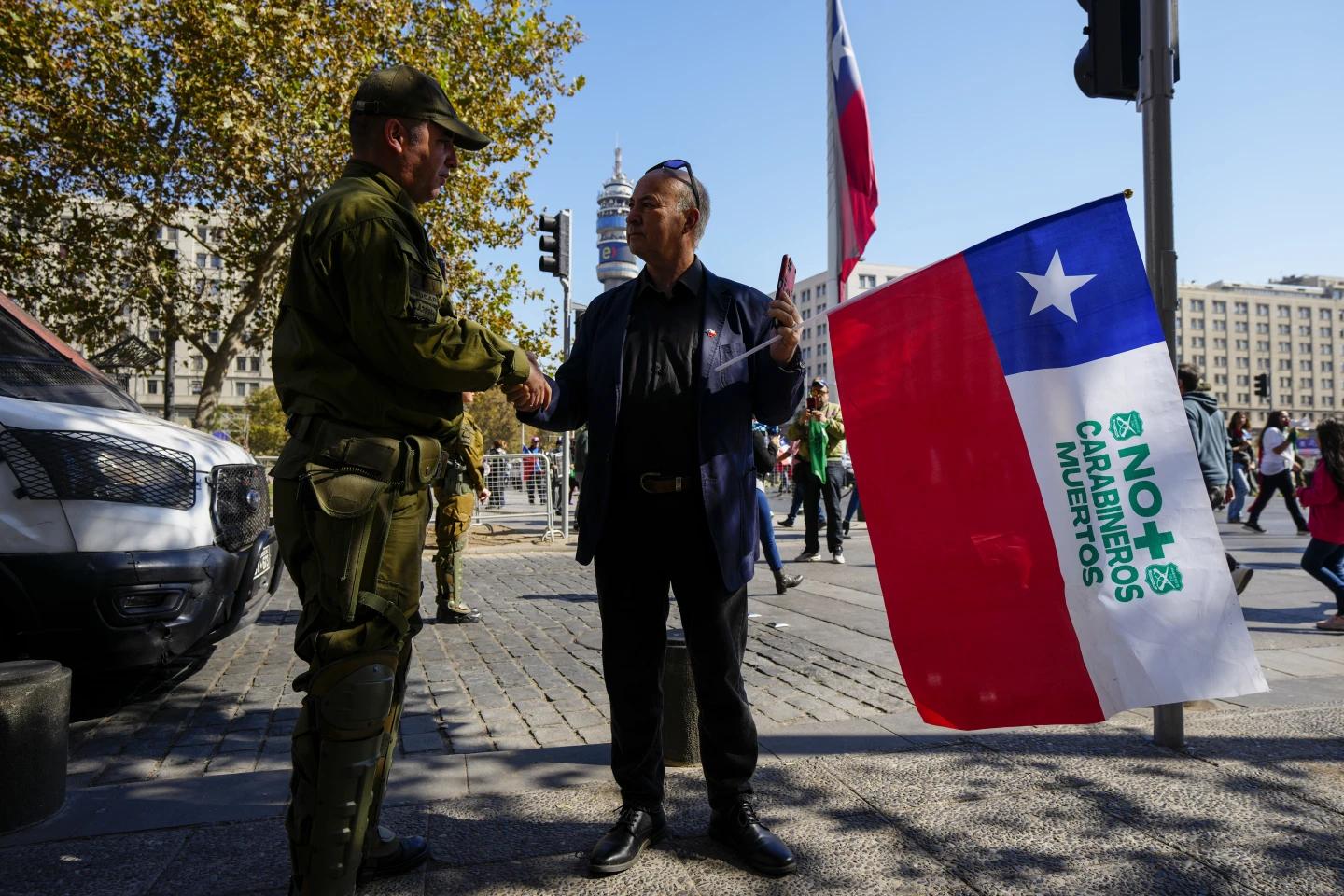SÃO PAULO, Brazil – In the wake of the brutal slaying of three police officers in Chile, an act that shocked the conscience of the South American nation, the country’s Catholic bishops stressed the themes of violence and public fear in an April 30 meeting with Chilean President Gabriel Boric.
Archbishop René Rebolledo of La Serena, who heads the epsicopal conference, said the encounter began with a mention of the tragic attack and the general insecurity felt by many Chileans.
The murders occurred in the early hours of Apr. 27, on a rural road, as a police car with three carabineros headed to a house to verify that a local resident had complied with precautionary measures decreed by authorities.
Their armored car stopped at some point, and the three men exited in circumstances which are still unclear. They were shot dead and put in the back of their truck, and the criminals who shot them then set their corpses on fire.
The atrociousness of the crime shocked many in Chile, a typically peaceful country where violence has been experiencing unprecedented growth over the past few years. While Chilean violence rates are still lower than those of its neighbors, the number of crimes such as kidnappings and murders have been rapidly increasing, along with drug trafficking.
The tally of homicides in Chile, for instance, rose from 845 in 2018 to 1,322 in 2022.
Boric’s administration has been taking measures to combat violence, raising the budget for security by 5.7 percent in 2024 and passing several laws to increase the penalties for felonies connected to organized crime. Despite that, a survey recently showed that 90 percent of people believe the government’s actions haven’t stemmed the tide.
The entrance of criminal groups from other South American nations – especially from Peru, Colombia, and Venezuela – is believed to be one of the factors of change in the security scenario in Chile. At the same time, international drug trafficking has been growing all over Latin America, and Chile is no exception.
In the southern part of Chile, threats to security are combined with a decades-old conflict between Indigenous Mapuche groups and the Chilean state over land and autonomy. Some of such movements have been resorting to violent actions, including arson. At times, Catholic churches are targeted and set on fire because they’re seen as landmarks of colonialism.
Over the years, some of those entities also began to take part in crimes like wood theft and drug trafficking, increasing the overall violence in the region.
The killing of the carabineros has been seen by analysts as a turning point in Chile’s security history, having attained an unprecedented degree of violence.
Bishop Juan Ignacio González of São Bernardo, who took part in the meeting with President Boric, said that the encounter began with the subject of the three caribineros’ deaths, given the enormous commotion it caused among the Chilean people.
“We talked about the criminality that has been provoking fear in the population. Our country wasn’t used to that kind of violence,” González told Crux.
He said that violence and immigration are somehow connected, something that can lead to an increasing xenophobia in Chile.
“There are Colombian and Venezuelan criminal groups operating here now. Some of them are involved in serious occurrences,” he added.
When it comes to drug trafficking, Chile used to be a consumer, but over the past few years it became a relevant spot on the map of drug circulation in South America, González described.
“The church always talks about building peace. But the current crisis has deep and complex roots. The police lost its authority in Chile years ago, for several reasons. It’s something difficult to recover now. We’ve been supporting them in that process,” he said.
González said that other themes were discussed with Boric, such as rules that make it difficult for immigrants to get a job and throw them into criminality. The government agreed to review the norms and to make it easier for foreign Catholic missionaries to get into Chile.
Violence, however, remains the dominant concern for many Chileans.
“People have been exposed to violence for a long time. Now, there has been a wave of violent crimes that didn’t use to be normal here. The violence in this particular case is not usual,” Jesuit Father Jorge Costadoat, a professor at the Catholic University of Chile, told Crux.
He said that no previous administration worked so hard to prevent crime as the Boric government, but organized crime is growing all over Latin America.
“That’s a regional phenomenon, something that is especially visible in countries like Ecuador,” he added.
The Chilean Church has played a role in running centers that welcome drug addicts, as well as Catholic activists have been accompanying inmates in prisons and helping them when they leave the penal system.
“But the drug issue is very hard to deal with and to eradicate,” he said.
According to Sister Nelly Leon, who has been working with Santiago inmates for 25 years, “organized crime has changed the landscape when it comes to felonies.”
“Ten years ago, crimes were not so violent like that one. Cruelty and violence are everywhere now,” Leon told Crux.
She said that it’s more difficult now to deal with crime, given that the situation is more complex and involves international gangs.
“The solution is not something like deploying the military to patrol the streets, a recurring idea among some social groups. We need more intelligence and technology in order to detect and detain the criminals,” she said.
In her opinion, it’s noteworthy that so many criminal activities have been happening in the southern part of Chile and the police still haven’t been able to detain the groups in charge of them.
“I think there are many more interests behind such crimes in the south. The people in charge are not only a few Indigenous groups,” she said.












